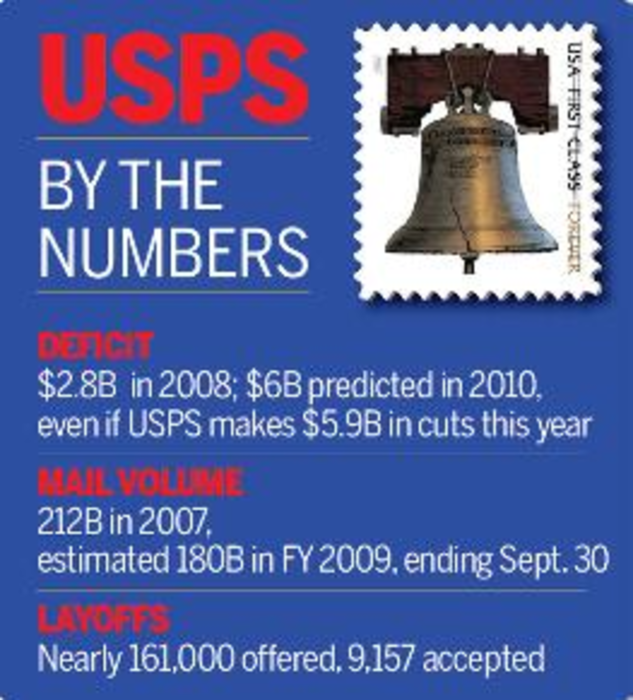With a $2.8 billion loss last year, decreasing mail volume, and a suggestion by Postmaster General John Potter that the agency may run out of money this year, the venerable US Postal Service is facing uncertain times. Experts suggest the agency’s future may hinge on financial or legislative changes from Congress.
Potter, in a Congressional hearing last week, urged lawmakers to provide the USPS with greater flexibility with regard to mandated retiree health benefit payments, appealed for support in cutting its delivery schedule and cited the agency’s cost-cutting efforts in streamlining costs and workers.
“I come before you today with only one agenda – asking for your support in preserving an effective, affordable Postal Service, capable of serving every American in every community, and one that remains an important economic driver for many years to come,” said Potter, who appeared before the House Subcommittee on Federal Workforce, Postal Service and the District of Columbia.
“These are extremely challenging times – for the nation and for the Postal Service,” he said. “We have done a great deal to preserve the future of our nation’s mail system. But there is more to be done, and we must do it together.”
A key item on Potter’s agenda is reforming the way the USPS funds its retirement health benefits.
He urged Congress to pass a bill, H.R. 22, which would reverse a policy that was instituted when the USPS experienced large surpluses and allow the agency to pay its share of retiree health benefits out of the Postal Service Retiree Health Benefits Fund instead of its own pocket. The move, which has drawn widespread support from postal unions and the mailing industry, could result in at least $2 billion in annual savings over an eight-year period, said Potter.
“The most important thing Congress can do is to pass H.R. 22, which will provide temporary relief from the crippling obligation to pre-fund future retiree healthcare costs,” said American Postal Workers Union President William Burrus in his House testimony last week.
As of March 27 the proposed legislation was still before the House Subcommittee on Federal Workforce, Postal Service.
National Association of Letter Carriers President William H. Young also backed the reforms, citing the survival of the USPS.
“We are not here today to ask for a taxpayer bailout, but we are here to ask the Congress for help,” he told the hearing.
Modifying the USPS’ payments to the retirement health benefit is vital to its continuing operation, said Dan Blair, chairman of the Postal Regulatory Commission, an independent agency, which exercises regulatory oversight over the USPS.
“We believe that legislative relief is warranted in that respect,” he said.
Potter also reiterated the idea of reducing the delivery schedule from six to five days, noting the removal of a legal requirement regarding days of delivery could result in annual savings of $3.5 billion.
The USPS also is looking to trim employees and delivery routes to cut costs.
Since December, the USPS has sent voluntary early retirement offers to nearly 161,000 of its employees.
Of those, 9,157 employees accepted the offer, said USPS spokesman Greg Frey.
“That’s around what we expected,” he said. “We expected around 3% to 5% and got about 5.5%.”
More than 87,000 city delivery routes are being consolidated — which could affect up to 50 million addresses – to maximize efficiency and reduce work hours and other expenses, according to the USPS Inspector General’s Office.
The PRC could back cutting a delivery day, but needs more details, such as what day would be cut, whether it would be year round or seasonal, and if it would be for the whole country or regional, Blair said.
Further, he said, while cutting a delivery day would likely save money, it also will further reduce volume in the mailstream.
“We estimated (reducing a mail delivery day) could save $2 billion a year, but it comes at a cost,” he said. “The Postal Service needs to quantify that cost.”
Jerry Cerasale, SVP of government affairs for the Direct Marketing Association, agreed that more information on cutting a delivery day is needed, but that the Postal Service needs to keep all its options on the table.
“They have to look at everything in order to remain viable,” he said.
Cerasale said it would be difficult for private shippers to pick up the extra 180 billion pieces of mail should the worst happen and the USPS can’t continue operating.
“The transition could be traumatic, and it would really hurt marketers if you have get parcels delivered,” he said.
Hamilton Davison, president of the American Catalog Mailer’s Association, said Potter has made strides to reign in costs at the USPS, and hoped Congress wouldn’t be skeptical of his requests due to past financial mismanagement by the Postal Service.
“I am hopeful Congress will see the wisdom in relaxing the prefunding obligation,” he said. “I don’t know what will happen if Congress doesn’t provide relief.”
Davison said the catalog industry could support a reduction in delivery days if it meant lower rates.
“That’s an option no one particularly wants, but it could be a viable option,” Davison said.






